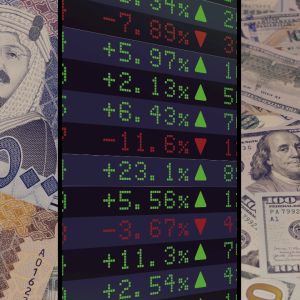The United States and Saudi Arabia have been tied at the hip for decades. But now, it’s looking like the Kingdom is ready to break away, and this isn’t just a diplomatic spat. This is the kind of geopolitical breakup that could disrupt energy markets, upend alliances, and crash global stocks markets as well as, of course, crypto. The bedrock of their relationship—the petrodollar—is crumbling, and that’s not something we can brush off. In June 2024, Riyadh ended its exclusive petrodollar deal, an arrangement that had tied its oil trade to the U.S. dollar for nearly 50 years. This wasn’t just a financial arrangement, it was a marriage of convenience that kept both sides in power. Now, Saudi Arabia is selling its oil in Chinese yuan, euros, and other currencies. Around 30% of their oil sales are now outside the dollar system, and that number is climbing. Plus, they are considering officially joining the BRICS bunch, whose whole deal is dethroning America. With Saudi on their side, they’d be able to do it in a heartbeat. Petrodollar divorce and a changing economic playbook The U.S.-Saudi partnership began in 1974 when both countries struck a deal that would define global finance for decades. The Kingdom sold its oil exclusively in dollars, and in return, the U.S. offered military protection and a global platform for Saudi influence. The decision to dump the petrodollar exclusivity wasn’t a snap judgment. It’s part of Saudi Arabia’s Vision 2030 plan, which aims to diversify the Kingdom’s economy. Oil might still be king, but Riyadh knows it can’t keep its future tied to a single resource—or a single currency. This also fits neatly into Saudi Arabia’s budding relationship with China, its largest trading partner. China is becoming Saudi Arabia’s gateway to global influence. The Kingdom has joined China’s mBridge digital currency initiative, a multi-central bank project aimed at revolutionizing cross-border payments. The goal is clear: ditch the dollar, and they’re not being subtle about it. This isn’t just about money, either. Saudi Arabia is courting Beijing for investment in its non-oil sectors—tourism, tech, and entertainment. Sorry to president Trump, but these guys could care less. Diplomatic chaos and a shaky U.S. The cracks in the U.S.-Saudi relationship aren’t just economic—they’re political. In March 2023, Saudi Arabia shocked the world by signing a China-brokered deal to restore diplomatic ties with Iran. Yes, Iran, the same country Washington has spent decades trying to isolate. This was a sign that Riyadh is no longer taking marching orders from the U.S. Then, in June 2024, the Kingdom made another bold decision. It declined to renew its security agreement with the U.S., a cornerstone of Middle Eastern stability since the Gulf War. That deal was a guarantee of U.S. military support in exchange for Saudi loyalty. Without it, the power dynamics in the Gulf are changing fast. Of course Saudi’s new alliances are making Washington nervous. If Riyadh starts buying military hardware from Beijing or Moscow, the U.S. loses its foothold in the region. Iran, emboldened by its new friendship with Saudi Arabia, might start flexing its muscles. The Gulf Cooperation Council, already a fragile alliance, could fracture further. Global markets on edge Saudi Arabia is shaking up global markets. By stepping away from the dollar, the Kingdom is challenging a system that has defined international trade for nearly a century. Global trade, which relies heavily on dollar transactions, could face serious instability. And let’s not forget the ripple effects on inflation, interest rates, and global economic growth. China, of course, is loving this. As Saudi Arabia’s top trading partner, Beijing benefits directly from Riyadh’s pivot. By conducting more trade in yuan, China strengthens its currency’s position on the world stage. For the U.S., this is a nightmare. If the dollar loses its grip on the oil market, Washington loses leverage over global trade. Saudi Arabia’s pivot isn’t without risks, especially for Crown Prince Mohammed bin Salman (MBS). Vision 2030 is ambitious, but it depends on foreign investment. By alienating the U.S., Saudi Arabia risks scaring off Western investors. There’s also the issue of domestic stability. The Kingdom is undergoing rapid change, and not everyone is on board. Unemployment is still a problem, and the oil revenues that have kept the country afloat are less reliable than they once were. If Vision 2030 stumbles, the Crown Prince could face backlash at home. The security implications of this decoupling are massive. Without U.S. military support, Saudi Arabia is more exposed to threats from Iran, the Houthis in Yemen, and other regional players.


















